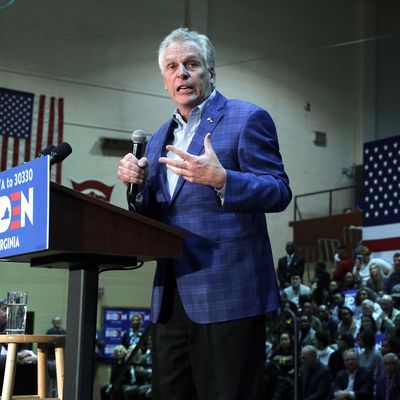
One of the things we learned from the 2020 elections is that the Commonwealth of Virginia really isn’t a highly competitive battleground state any more. In fact, as I noted to my own surprise, Alaska was more competitive than Virginia, where Joe Biden won the first double-digit popular-vote victory since George H. W. Bush did so back in 1988. The transition of Virginia from red to purple to blue had a number of key landmarks, notably the Democratic conquest of both legislative chambers in 2019 and of all statewide offices in 2017. But without question, one step down that road occurred in 2013, when the famed national Democratic “fixer” Terry McAuliffe broke a streak of nine consecutive gubernatorial losses by the candidate of the party controlling the White House.
After sitting out a mandatory four years (Virginia is the only state that still prohibits consecutive gubernatorial terms), McAuliffe has already announced he will run again in 2021. But the question must be asked: Is the former governor a figure from the past at a time when his state and his party really need a new generation of leadership?
One of McAuliffe’s rivals for the Democratic gubernatorial nomination is raising that question pointedly:
[Jennifer] Carroll Foy, at 39 the youngest candidate in the field, was not shy about attacking Mr. McAuliffe as a creature of the past.
“Career politicians like Terry McAuliffe are interested in maintaining the status quo,” she said in a statement Tuesday night. “But Virginians are calling for change. They want someone who understands their problems as I do because I’ve lived them. While I respect Terry McAuliffe’s service, he doesn’t understand the problems Virginians face. A former political party boss and multimillionaire, Terry McAuliffe is simply out of touch with everyday Virginians.”
A recent New York Times profile of McAuliffe noted that he “is close enough to former President Bill Clinton that the two men speak daily, and he claims to make more than 100 phone calls every day.” The 42nd president is now most definitely a has-been in Democratic politics, and any millennial would be horrified at the idea of making ten — much less 100 — phone calls a day.
McAuliffe represents the past in a more basic way, too: He is a white man, like 72 of the 73 governors Virginia has elected in the past (the one exception being Black Democrat Doug Wilder, who was elected in 1989). Foy, a second-term member of the Virginia House of Delegates, is one of two Black women — the other is State Senator Jennifer McClellan — already in the field against McAuliffe. Foy, like McAuliffe, hails from northern Virginia, the progressive-trending suburban area which is expected to cast about half the votes in the 2021 Democratic gubernatorial primary. McClellan is from Richmond.
A third Black candidate, also from northern Virginia, is far more controversial: Lieutenant Governor Justin Fairfax, who was the odds-on favorite for the 2021 gubernatorial nomination until he was hit with dual allegations of sexual assault in 2019. While he has vociferously denied the allegations (admitting sexual encounters in both cases but claiming they were consensual), and no criminal charges have been filed, he’s been unable to shake the scandal. In a bizarre twist of fate, the sexual-assault scandal also roughly coincided with the highly damaging revelations of photographs of the two white Democrats elected to statewide office alongside Fairfax in 2017 — Governor Ralph Northam and Attorney General Mark Herring — wearing blackface.
This tripartite wave of scandals (Northam is barred from reelection, and Herring has chosen to run for reelection) hitting the top of the Virginia Democratic career ladder has simultaneously fueled the rise of new candidates like Foy and McClellan and created some nostalgia for the stability a familiar name like McAuliffe may offer. (An even more unusual figure, Lee Carter, a self-identified democratic socialist and yet another politician from northern Virgina, has filed paperwork for a gubernatorial bid — but has made it clear he may not actually run.).
The racial dimension of the 2021 primary has led McAuliffe to secure early and conspicuous support from Black political leaders, as the Hill observed after his announcement:
In a show of the support he retains from state legislators in Richmond, including some of Virginia’s top Black lawmakers, McAuliffe named state Sen. L. Louise Lucas, House Majority Leader Charniele Herring and Richmond Mayor Levar Stoney as campaign co-chairs.
Virginia is not one of those southern states with a majority-vote requirement for primaries, so it’s possible that voters wanting fresh or more diverse leadership could split their votes, providing the invariably well-financed McAuliffe an easy path to the nomination.
Some Democrats may also stick with McAuliffe out of fear that Republicans could make a 2021 comeback (partially based on the pre-2013 history of the party holding the White House usually losing the gubernatorial contest). But the GOP, which will hold an activist-dominated state convention rather than a primary, doesn’t have an obvious world-beater in the wings. The very Trumpy state senator Amanda Chase is already in the field, challenging early front-runner Kirk Cox, a former Speaker of the House of Delegates.
The Democratic primary is scheduled for June 8. It’s probably McAuliffe’s race to lose, unless progressives can manage to unite behind one of the challengers.






























